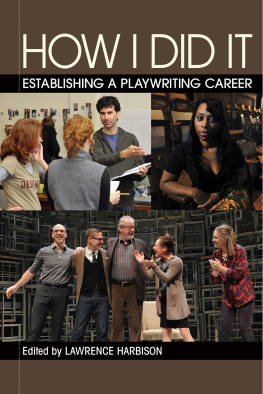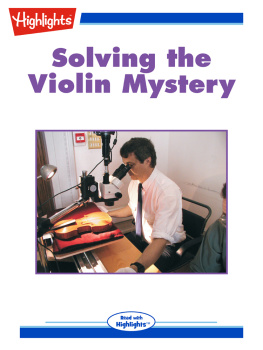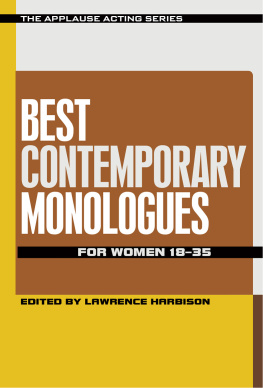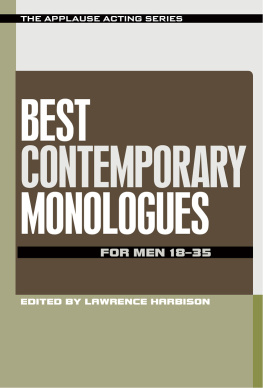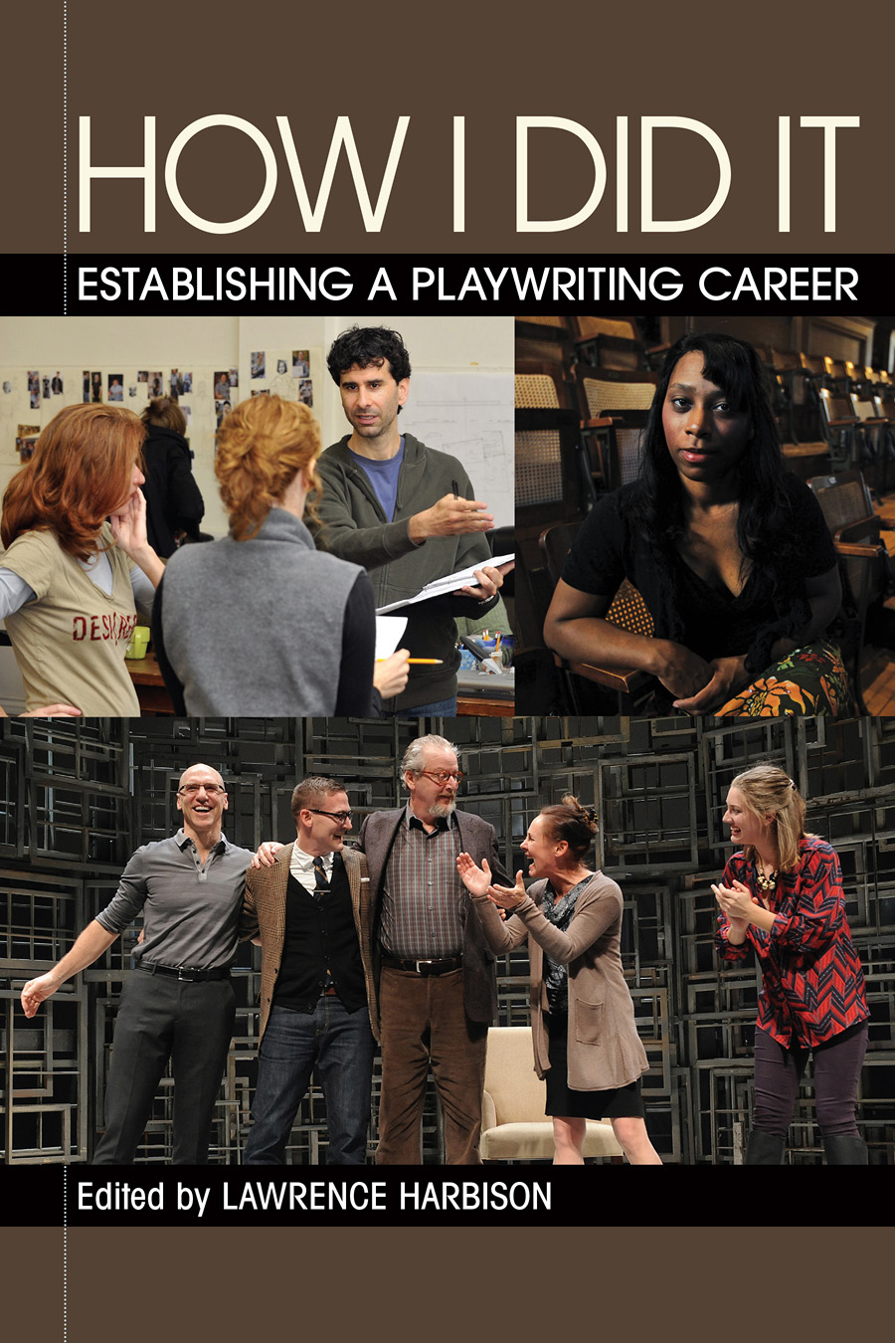Copyright 2015 by Lawrence Harbison
All rights reserved. No part of this book may be reproduced in any form, without written permission, except by a newspaper or magazine reviewer who wishes to quote brief passages in connection with a review.
Published in 2015 by Applause Theatre & Cinema Books
An Imprint of Hal Leonard Corporation
7777 West Bluemound Road
Milwaukee, WI 53213
Trade Book Division Editorial Offices
33 Plymouth St., Montclair, NJ 07042
Printed in the United States of America
Book design by John J. Flannery
Library of Congress Cataloging-in-Publication Data
Library of Congress Cataloging-in-Publication Data
How I did it : establishing a playwriting career / edited by Lawrence Harbison ; introduction by Theresa Rebeck.
pages cm
ISBN 978-1-4803-6963-4 (pbk.)
1. Playwriting. 2. Authors and theater. 3. Drama--Technique. I. Harbison, Lawrence, editor.
PN1661.H64 2015
808.2--dc23
2014046382
www.applausebooks.com
Contents
How do playwrights get their start? Where does the idea of being a playwright even come from, and then how does one start?
Once someone starts writing, how does that person figure out how to get a raw new play from a complete nobody to a place where someone produces it? And then what happens? And then what?
In a series of interviews that are chock full of the kind of information that other playwrights want to hear, Larry Harbison poses these questions to some of Americas finest contemporary playwrights. In conversations that range from a discussion of what kind of temp work you were doing when you started out as a playwright to how you got your first agent, and from who gave you a hand up to the thrill or heartbreak of that first production, Harbison focuses on the mysterious moment when a playwright steps out of that chrysalis and starts to emerge.
The designation emerging playwright is so commonplace that no one is quite sure what it means. Intuitively, one might think it means a playwright who nobodys ever heard of. Or, a playwright whose plays are pretty good, but who has never had a production.
Or, a playwright whos had a couple of productions in smaller venues but is hoping to get into a bigger house. Or, a playwright who has had a couple of productions but has made no money at all at it and still harbors the fantasy that someday someone might actually pay him or her to do this.
Or, a playwright who is teaching playwriting at a university but struggles to get his or her own work into production.
Recently, I was told that emerging playwright doesnt mean any of that. Apparently, some people think an emerging playwright is actually a playwright who has already emerged enough to get the attention of people who might agree that this emerged playwright could use some help emerging further. Which means, I guess, that we need another word for what happens before that. Aspiring? Depressed? Hopeful? Wannabe?
People seem very concerned about these designations. Right now, the ones in vogue are emerging playwright , midcareer playwright , and master playwright . Although I have a friend who had a couple of strong pops straight out of graduate school, and since then, not much. She calls herself a submerged playwright. Frankly shes not the only one who worries about submerging; anything past emerging and before master is a little worrisome. Will you make it through midcareer or will you fall away into teaching or raising children or (oh no!) television?
That is not our concern today. Today we are looking at the moment when some of our most compelling playwrights emerged. Their stories are simply told, with appropriate attention to detail, which Harbison nurses out of them with a shrewd eye. They are in fact the stories that every young playwright wants to know. How does that moment happen?
Its hard to emerge. As I read these interviews, they reminded me of a little bird, pecking like hell to get out of its egg and get on with things. We are right to be obsessed with the question of emergence. Im also struck by the way the word emergence glides so effortlessly into the word emergency. There is no question that climbing out of that shell is essential to life; you will suffocate in there if you dont make it out.
But there are ways to get out of that shell. Harbison and his pantheon of playwrights have information about that.
Theresa Rebeck
September 20, 2014
In August of 2011, I traveled to Hollins University in Roanoke, Virginia, for the schools presentation of plays by its MFA students. I was a distinguished guest, and my job was to comment on all the plays that were read. After one play another distinguished guest, a fellow who in his youth had founded what has since become arguably the most important producer of new plays in New York and, by extension, in the country, said that there werent very many good plays being written. A spirited discussion ensued, during which I took him on, basically telling him that he didnt know what he was talking about.
I go to the theater at least two hundred times a year. I read at least another two hundred plays, all of them produced recently, sent to me by agents and playwrights. I also read at least five hundred ten-minute plays, because I edit an annual anthology of same. Not all of these plays are goodbut a lot of them are. There are a lot of terrific plays being written each year, by a horde of exciting playwrights, many of whom I interviewed for this book, many of whom are still trying to establish their careers. One could sayin fact, Ill say itthere have never been more excellent plays being written in history .
The irony is, though, that it has never been harder for a playwright who is just starting out to establish himself. Or herself. One of the reasons for this is the staggering competition. Too many good plays, too few slots. Another is that theaters, having cut back on their reading staffs, are relying more and more on developing relationships with playwrights whose work appeals to them. Sometimes, this is to varying degrees an informal relationshipas in, we like your work and hope youll keep us in mind for your next playbut more and more, it involves commissions, which are proliferating at an astounding rate. You would think that theaters wouldnt have much money to commission playwrights. You would be wrong. The theater founded by the gentleman mentioned in my first paragraph has several different commissioning programs, and at any given time has fifteen to twenty playwrights under commission. Thats great if youre one of those playwrights, but I think it turns that theater into a private clubnew members need not apply. I know agents who submit plays to theaters not for them to be considered for production but in hopes they can get their clients commissions.
Nevertheless, each year many heretofore neophyte playwrights manage to get productions of their work done, starting them on their way to fame and middling fortune. How do they do itand how can you do it? In this book, you will read stories about how its done.
One thing I have to mention, though: all too often, playwrights jump the gun in getting their work out there. Just because you have typed The End or End of Play doesnt mean your play is ready for anyone to read. Do readings of it with your friends; try to get into a playwright workshop. If there isnt one in your area, start one. Find yourself an experienced dramaturg who can help you develop your work and get it ready to be sent out.

